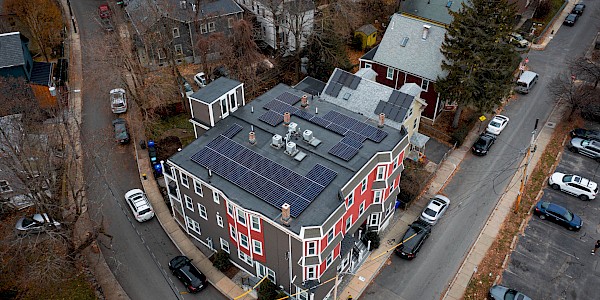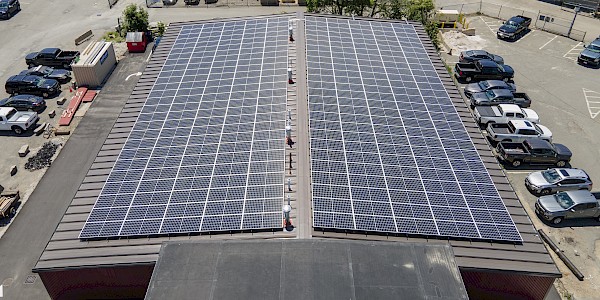What you should know about installing solar panels
Published on BostonGlobe.com, 7/25/15, by Lorne Bell, Globe Correspondent
Across the state, solar company sales representatives are marching door to door, offering installation contracts that seem hard to refuse: solar panels for no money down, with no maintenance, and electricity at prices significantly below those of utilities.
So, is it a good deal?
These contracts are known as power purchase agreements and they are largely responsible for the boom in residential solar panels here and across the country. Of the 189,000 residential solar units installed in the United States last year, more than 70 percent were power purchase agreements, according to Cory Honeyman, senior analyst with Boston-based GTM Research, which provides data and consulting for the green tech industry.
Power purchase agreements offer an alternative to buying and installing residential solar panels, which cost about $21,000 for a typical 6,000-killowatt-hour system, according to GTM. Instead, solar companies purchase, install, and maintain panels on customers’ homes at no cost for a contractual period of 20 to 25 years.
In return, homeowners pay the solar company for the energy produced by the panels, usually at discounts up to 25 percent lower than utility rates. The contracts also fix annual rate increases to offer predictability in the erratic energy market.
Residential solar systems can produce anywhere from 40 to 95 percent of a home’s electricity, and they can lower overall electric costs by 10 to 20 percent, says Jonathan Bass, spokesman for SolarCity Corp. of San Mateo, Calif., the nation’s biggest residential solar company. SolarCity has about 15,000 customers in Massachusetts.
For homeowners who cannot afford or do not want to pay the upfront costs of solar panels, power purchase agreements offer immediate savings and cleaner energy. Still, said Honeyman, consumers should carefully weigh their options.
“There is a lot of fine print in those contracts,” he said, “and there are important risks and considerations to keep in mind.”
The first consideration is the 20- to 25-year contract. That commitment means that if a homeowner sells his home, he must buy out the remaining years or transfer the contract to the new owner.
The balance owed when a contract ends early is based on projected solar electricity rates, average usage, and remaining time on the contract. In a typical contract charging 13 cents per kilowatt hour, for a typical home consumer 6,000 kilowatt hours a year, buying out the last 10 years could cost more than $8,000.
Solar companies say that in nearly all cases — SolarCity estimates 98 percent — homeowners transfer their contracts to the buyers.
Another consideration: the falling price of solar panels could make buying a solar power system more attractive than a power purchase agreement. The average cost to install residential solar power has plunged 73 percent since 2006, according to the Solar Energy Industries Association, a Washington trade group, and those costs are expected to decline further.
For those who can afford to buy or finance solar panels outright, owning a system can provide additional financial benefits. For one, instead of paying a solar company for the electricity produced on the homeowner’s roof, that energy is free.
Owning the panels also allows residents to reap state and federal tax credits and other incentives, which under purchase agreements, go to the solar companies. A typical $20,000, 6,000-kilowatt-hour system could generate $1,200 to $1,800 annually through the incentives — enough to cover the cost of loan payments, said Josh Mailloux, sales manager at Boston Solar of Woburn, which installed nearly 800 residential systems in Massachusetts last year. Most were purchased by homeowners.
“It’d be nice if people had some idea of what they’re giving up” with power purchase agreements, Mailloux said.
As panel prices slide, analysts expect the market share of power purchase agreements to shrink and more homeowners buy systems outright. SolarCity, which has relied almost exclusively on these agreements, recently added a loan program, called MyPower, to finance residential purchases.
Whether homeowners buy panels or enter a power purchase agreement, residential solar could face a challenge in 2017, when the 30 percent federal investment tax credit is set to expire for homeowners and fall to 10 percent for solar companies. Analysts expect residential solar installations to accelerate over the next two years as homeowners and solar companies seek to take advantage of the program before it expires.
Congress could extend the tax credits. But if lawmakers don’t, the pace of solar installations will slow, analysts said. For the time being, said Honeyman, power purchase agreements still offer a good deal for many low- and middle-income homeowners who can’t afford the upfront costs or don’t want the maintenance and other hassles of ownership.
“The case for [power purchase agreements] is still viable,” he said. “In the end, there are meaningful savings opportunities.”



